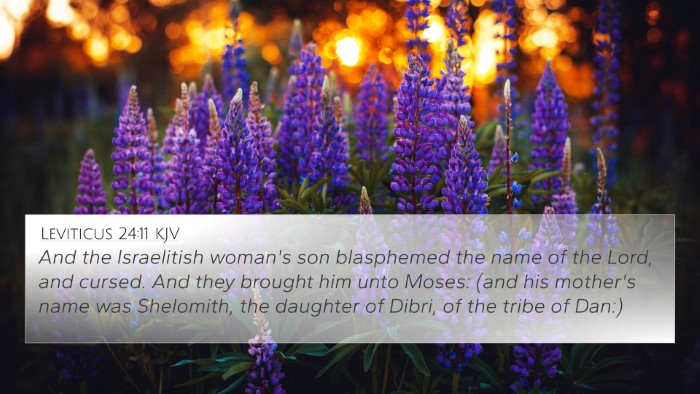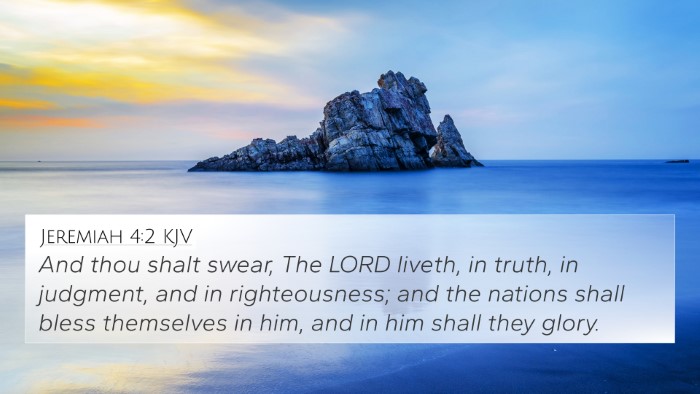Understanding Leviticus 19:12
Verse: "And ye shall not swear by my name falsely, neither shalt thou profane the name of thy God: I am the LORD."
Summary of Leviticus 19:12
Leviticus 19:12 serves as a warning against misuse of God's name, emphasizing the holiness of God's name and the importance of integrity in speech. This verse calls believers to uphold the sanctity of God's name and to avoid swearing falsely.
Commentary Insights
Matthew Henry's Commentary
Matthew Henry emphasizes the gravity of swearing by God's name. He explains that swearing involves invoking the name of God to affirm the truth of what one says. This act should be treated with utmost respect, as misusing God's name not only brings guilt upon the individual but also dishonors God. He also points out that God’s name should never be profaned, and believers ought to align their actions and statements with His character.
Albert Barnes' Commentary
Albert Barnes notes that this verse serves as a prohibition against false oaths. He emphasizes that God's name should be revered, and by swearing falsely, one not only lies but also desecrates the sacred name of God. Barnes discusses the significance of integrity in a believer’s life, stating that honesty should permeate all aspects of life, particularly in how one represents oneself and God.
Adam Clarke's Commentary
Adam Clarke interprets this verse as a directive for maintaining reverence towards God’s name. He elaborates on the importance of truthfulness and how swearing falsely might bring about severe consequences, not only for the person who lies but also for the community that witnesses such behavior. Clarke connects this commandment to broader biblical teachings about honesty and the importance of upholding God’s name.
Related Bible Cross References
- Exodus 20:7: "Thou shalt not take the name of the LORD thy God in vain; for the LORD will not hold him guiltless that taketh his name in vain."
- Numbers 30:2: "If a man vow a vow unto the LORD, or swear an oath to bind his soul with a bond; he shall not break his word, he shall do according to all that proceedeth out of his mouth."
- Deuteronomy 6:13: "Thou shalt fear the LORD thy God, and serve him, and shalt swear by his name."
- Psalms 29:2: "Give unto the LORD the glory due unto his name; worship the LORD in the beauty of holiness."
- Matthew 5:34-37: "But I say unto you, Swear not at all; neither by heaven; for it is God's throne..."
- James 5:12: "But above all things, my brethren, swear not, neither by heaven, neither by the earth, neither by any other oath: but let your yea be yea; and your nay, nay; lest ye fall into condemnation."
- 1 Timothy 1:10: "For whoremongers, for them that defile themselves with mankind, for menstealers, for liars, for perjured persons, and if there be any other thing that is contrary to sound doctrine."
Thematic Connections and Analysis
This verse illustrates the broader biblical theme of the sanctity of God’s name and aligns with similar commandments found throughout the Scripture. Both Old and New Testament teachings warn believers against the misuse of God’s name and stress the importance of maintaining integrity. The cross-references provided exemplify a unified biblical narrative about truthfulness, reverence, and the consequences of dishonesty.
Applications for Study
For readers seeking to deepen their understanding, consider the following:
- Use a bible concordance to explore further instances of swearing and oaths across scripture.
- Engage in cross-reference Bible study techniques to compare teachings on truthfulness between different books of the Bible.
- Look into how Old Testament laws regarding oaths are fulfilled and reinterpreted in the New Testament, particularly through the teachings of Jesus and the Apostles.
Conclusion
Leviticus 19:12 reminds believers of the importance of honoring God's name and speaking truthfully. Insights from respected commentators highlight the seriousness of this command and its relevance in contemporary discussions about ethics and morality. By examining related scriptures and employing cross-referencing tools, one can gain a more comprehensive understanding of this vital biblical principle.
















